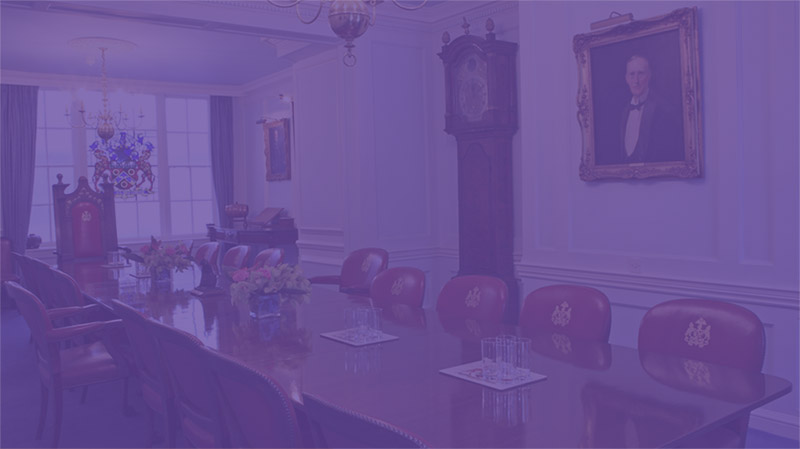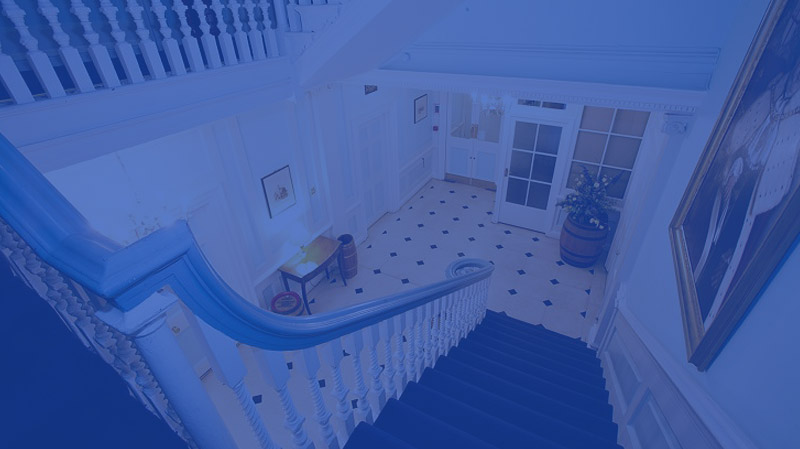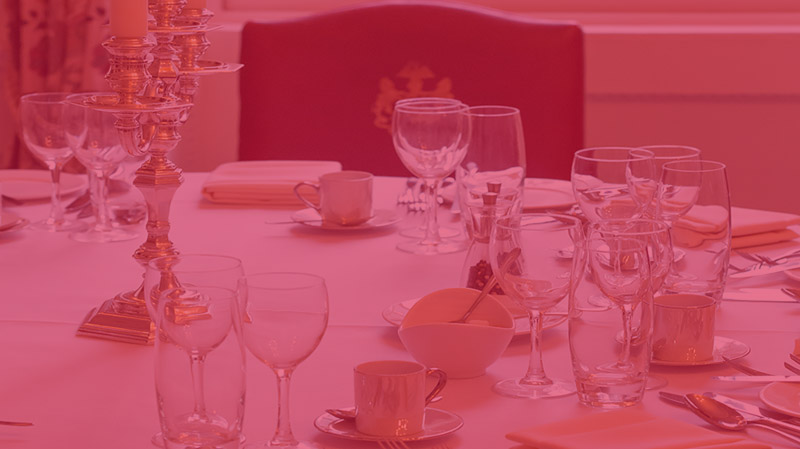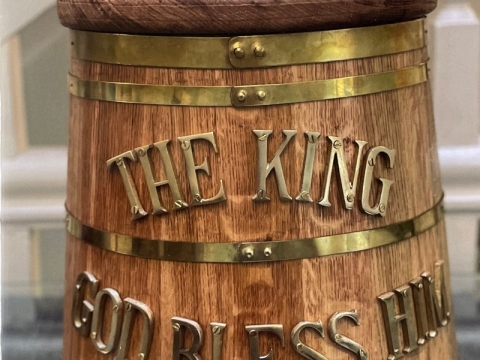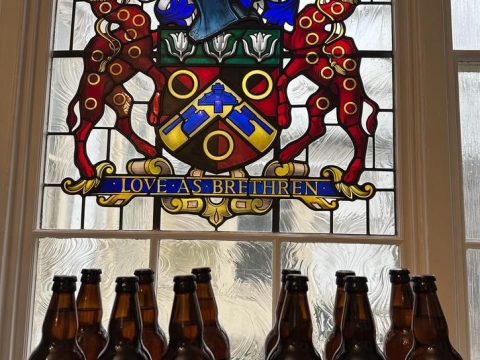The Middle Ages |
|
|
EDWARD I
|
|
|
1298
|
Coopers appeared before Mayor and were fined for 'Contempt of King and Mayor'
|
|
1299
|
Original Deed of land in Basinghall Street.
|
|
|
|
|
RICHARD II
|
|
|
1396
|
Coopers applied to Mayor and Aldermen to restrain some coopers for making vessels for beer or other liquors from soap or oil tuns.
|
|
|
|
|
HENRY IV
|
|
|
1409
|
Vessels for liquor to be made only of pure wood.
|
|
|
|
|
HENRY V
|
|
|
1420
|
Each cooper to have his own mark of iron with a copy kept at Guildhall.
|
|
1422
|
Wardens sworn into office before Mayor and Aldermen.
|
|
|
|
|
HENRY VI
|
|
|
1428
|
A petition to Mayor and Aldermen from Wardens for another ordinance to regulate the trade.
|
|
1439
|
The "Vellum" book-the earliest known record book of the Company giving the names of two Wardens, William Downinge and John Browne and 40 brethren.
|
|
1440
|
A further petition to the Mayor and Aldermen to regulate the trade.
|
|
1457
|
The Mayor and Aldermen passed an ordinance that all vessels made from inferior wood be burnt.
|
|
1464 |
First record of a search by the Wardens resulting in threescore barrels, kilderkins, and firkins for herrings being seized and burnt at the Standard (a water conduit) Cheapside in the presence of the Mayor.
|
|
|
|
The Tudor Period |
|
| HENRY VII | |
| 1485 | John Baker Upper Warden. |
| 1488 | Wardens applied to Mayor and Aldermen for extended rules and orders for the better government of the trade. |
| Earliest record of apprentices. Twelve were registered on payment of 20 pence each. | |
| John Baker's Bequest-his property known as "The Swan" in Basinghall Street to pass to the Company, after the life interest of his widow, if Charter of Incorporation granted. | |
| 1495 | The first record of a cooper's mark. |
| 1501 | 29th April. Royal Charter granted by Henry VII stipulated a Master, two Wardens. |
| 1502 | Hugh Crompe the first to hold office as Master |
| HENRY VII | |
| 1509 | 27th September, Grant of Arms by Henry VIII. Motto "Gaude Maria Virgo". |
| 1523 | Earliest known Wardens' Account Book. |
| 1531 | An Act of Parliament passed to empower the Wardens of the Company to view and gauge all barrels in London and for 2 miles outside. Those vessels approved to be marked with St. Anthony's Cross. The Company authorised to charge one farthing per vessel. Defective vessels could be seized. A company "Sealer" appointed. |
| 1536 | Nicholas Gibson, Grocer, built a school and almshouses at Ratcliffe for 30 boys and 14 pensioners. Anthony Knyvett appointed "Black Rod". |
| 1537 | Ruling on apprentices. Journeymen coopers one each; Liverymen two; Upper Warden and Master three. |
| 1540 | Nicholas Gibson buried in Stepney Parish Church of St. Dunstan's. |
| 1541 | Avice Gibson, widow, married Sir Anthony Knyvett. (His father, Thomas, Master of the Horse to Henry VIII). |
| 1543 | John Chorley Master of the Company. |
| John Heath, Upper Warden, instigated the construction of our first purpose-built Hall. He donated the main timbers and paid the workmen for a period of time. |
|
| 1547 | The first Hall was completed. It is thought to have been built in the yard of the house called "The Swan" (next to the churchyard of St. Michael's) that had been left to the Company by John Baker . John Heath, Master of the Company, provided the venison for the celebratory feast. |
| EDWARD VI | |
| 1549 | Sir Anthony Knyvett died. Coopers' Company became tenants of Lady Knyvette at Ratcliffe. |
| MARY I | |
| 1553 | Existing Minute Books of the Company begun. First pensioners were received into the Almshouses at Ratcliffe following Deed of Gift of the Gibson Charity to the Company by Lady Knyvett. John Chorley left Old Wool Quay in the Parish of All Saints Barking to the Company for the benefit of the Ratcliffe Charity. |
| 1554 | October. Lady Avice Knyvett dies. |
| 1558 | Mary I and Philip confirm the Charter. Old Wool Quay sold to the Crown for £400. |
The Elizabethan Age |
|
| ELIZABETH I | |
| 1559 | Elizabeth I confirms the Charter. The Company contributes to the ransom of Baron Thos. Wentworth, Lord of the Manor of Stepney and Governor of Calais. |
| 1563 | Pall Cloth made for £70. First appointment of a Renter Warden. |
| 1571-2 | Hand decorated Book of Accounts made (still in the Company's possession). |
| 1574 | Death of Henry Cloker, Grocer. Under the terms of his Will an annual service to be held at St. Michael's Crooked Lane. |
| 1591 | New Pall Chest made (still in the Company's possession). |
| 1599 | Peter Thelloe bequeathed half rent of a house in Birchin Lane to the Ratcliffe charity. |
The Stuart and Commonwealth Period |
|
| JAMES I | |
| 1611 | Tobias Wood, Standing Counsel to the Company, left £600 to erect 6 additional almshouses at Ratcliffe. |
| 1612 | The Company, unable to continue payments, relinquishes share of the City of London's plantation in Ulster governed by the Irish Society. |
| CHARLES I | |
| 1643 | The Company's plate worth £150-£200 sold to raise the Company's levy of £350 as part of £50,000 to be raised by Livery Companies for the Parliamentary armies. |
| CROMWELL | |
| 1653 | 9th June. Monthly Courts to be held on 1st Tuesday of the month. |
| 1658 |
Election Day for Masters and Wardens changed from Sunday to Monday before the Feast of Pentecost or Whitsuntide (Common Hall). The Stuart Restoration |
| CHARLES II | |
| 1660 | The Brazil Staff given by Mr. John Hardy fitted with a silver top of the Company's Arms. A cloth gown to be provided for the Beadle with liverymen paying 2s.6d each towards the cost. |
| 1661 | 30th August. Charles II Governing Charter stipulated one Master, two Wardens and seventeen Assistants. 1662 First barge of Company built for £178.10s.0d of which £154.10s.0d was raised by the Livery. |
| 1664 | An Ordinance made that the seals for sealing casks be kept only by Wardens or their deputies. |
| 1665 | May 2nd. Temporary closing of the School at Ratcliffe due to the Plague. |
| 1666 | 4th September. Plate and records removed by Wardens and Clerk and stored in the house of Mr. Morris, Upper Warden. 5th September. The Company's Hall destroyed in the Great Fire. |
| 1667 | Plate and records still to be held at Mr. Morris's house-now Master. |
| 1668 | September. First sketches and first list of contributors towards re-building Hall. |
| 1669 | March. A building committee appointed consisting of the Master, Wardens and some Court members. |
| 1670 | First meeting in new Hall. |
| 1671 | Royal Arms carved in wood fitted between windows and paid for by Mr. Mason, Master. |
| 1672 | April. Agreed that the Hall could be used for worship on Sundays, and let out for functions such as weddings and funerals. |
| 1678 | The Hall finally completed at a cost of £5,000. Subscribed by the Court and the Livery mainly between |
| 1669-1671 | October. The Pall Cloth sold for £8 towards cost of the new Hall. April 23rd. The Company surrendered Charter to the Crown. |
| 1685 |
Revised Charter issued by Charles II. |
| JAMES II | |
| 1686 | Second barge built for £80. |
| WILLIAM & MARY | |
| 1695-6 | Ratcliffe Almshouses built. |
| ANNE | |
| 1703 | Henry Strode Master. |
| 1704 | 6th May. Henry Strode died aged 59. In his will he left £50 to increase pensions of Ratcliffe almspeople, and £6,000 to build a free school and almshouses at Egham. |
| 1706 | Strode's school and almshouses built. |
The Georgian Age |
|
| GEORGE I | |
| 1715 | William Alexander acquired Woodham Mortime Hall with 300 acres. |
| 1718 | Third barge built for £352. |
| 1726 | William Alexander died. He bequeathed his Essex estate to the Company and its revenue to the poor of the Company. |
| GEORGE II | |
| 1741 | Bye-laws for regulation and government of Company adopted. |
| 1742 | Robert Willimott Lord Mayor. He was the first person to hold office from a minor company. |
| 1743 | Robert Willimott elected Master of the Coopers Company. He presented two silver waiters to the Company. |
| 1746 | Major repairs to Egham School and Almshouses. |
| GEORGE III | |
| 1767 | Sir James Esdaile appointed Alderman for Cripplegate Ward and became a member of the Court of Assistants and Master of the Company. |
| 1777 | Sir James Esdaile Lord Mayor. He remained a Cooper. |
| 1779 | Committee appointed to build a new barge. Nothing came of the proposals so the bargemaster was dismissed. (From then on the Company either shared or hired a barge). |
| 1786-7 | Ratcliffe School and Chapel (added by Lady Knyvett) rebuilt at cost of over £1,200. |
| 1793 | Common Hall dinners and Lord Mayor's Day dinner discontinued. |
| 1794 | Ratcliffe Charity buildings destroyed by fire. |
| 1796 | School and almshouses at Ratcliffe rebuilt by insurance money north of old site with the quadrangle facing Schoolhouse Lane. |
| 1802 | Ratcliffe Chapel rebuilt and quadrangle paved. |
| 1803 | Second Hall used for State lotteries. |
| 1816 | Gas Lighting installed in the Hall. |
| GEORGE IV | |
| 1824 | May 31st. Election of Abraham Algar to post of Under Warden. (The first time the Livery had voted for its own candidate.) |
| 1825 | May. J.F. Firth elected by Livery to post of Under Warden. (The Upper Warden was A. Algar.) |
| 1826 | William Alexander Memorial obelisk erected at Woodham Mortimer (still in existence) marking the centenary of his death. Second Hall no longer used for State lotteries. |
| 1827 | 25th May at the "George & Vulture" tavern, Cornhill. The Society of the Livery founded to maintain the rights of the Livery, especially in the matter of the election of Wardens. |
| 1828 | Almshouses and school at Egham rebuilt. |
| WILLIAM IV | |
| 1831 | Felix Booth Master of the Company. David Salomons admitted to Freedom & Livery of Company after |
| 1830 | ruling by Common Council concerning the admission of Jews. |
| 1835 | Felix Booth made a baronet-due to financial help of £17,000 he gave to Captain John Ross to find North West Passage David Salomons elected Sheriff and member of Court of Assistants. |
The Victorian Era |
|
| VICTORIA | |
| 1840 | Office of Clerk divided into Clerk-Accountant (non resident) and Clerk-Solicitor (resident) |
| 1841 | David Salomons Master of the Company. |
| 1847 | J.F. Firth Master of the Company. Sir David Salomons Alderman for Cordwainer Ward after 1845 Act of Parliament allowed Jews to hold municipal office. He established a scholarship at the City of London School to celebrate the event. |
| 1848 | J.F. Firth reorganised Ratcliffe School and saved it from extinction. |
| 1855 | Sir David Salomons Lord Mayor. 1865 Plans for third Hall approved. Accommodation provided for Beadle but not for the Clerk. The architect Geo. Barnes Williams, Surveyor to the Company. |
| 1867 | Offer of £21,000 from the City Corporation accepted by the Company for two-thirds of the site of second Hall. 1868 Third Hall erected. Foundation stone laid on 7th January by the Master C.J. Chadwin. |
| 1869 | October. Sir David Salomons made a Baronet. Completion of new Hall at cost of £5,200. 300 boys at Coopers' Company's School. New building for Upper School. |
| 1872 | The Master's Badge presented by Thomas Rowland Legg at the end of his year of office as Master. |
| 1873 | Mr. Cyrus Legg, Master (brother of Thomas) presented the three gold Wardens' badges. |
| 1874 | D. Henry Stone Lord Mayor and Master of the Company. |
| 1875 | The custom introduced of a silver medal being given to a new Court member, to be gilded upon leaving the office of Master. |
| 1878 | The Company established a Secondary School for girls at No. 141 Mile End Road. |
| 1880 | The Girls School moved to larger premises at No. 86 Bow Road. |
| 1884 | The City and Guilds of London Technical Institute founded, with the Company being a founder member. |
| 1891 | The Stepney & Bow Educational Foundation formed under pressure from the Charity Commissions who forced a merger of the Coopers' Boys School at Ratcliffe with the Coborn School founded in 1701 by Miss Prisca Coborn, on the premises of the latter school for boys at Tredegar Square, Bow. The school named Coopers' Company's School whilst the girls school renamed Coborn School at No. 86 Bow Road. |
| 1894 | Old Ratcliffe Almshouses demolished, and the inhabitants pensioned off. |
| 1898 | The girls Coborn School moved to new premises at No. 29-33 Bow Road, and opened by HRH Princess Christian. |
The 20th Century |
|
| EDWARD VII | |
| 1904 | Andrew Chalmers, Master of the Company, presented the silver-gilt chain to be worn with the Master's badge. |
| 1908-9 | The Boys School moved from Schoolhouse Lane, Ratcliffe and rebuilt at Tredegar Square, Bow. |
| GEORGE V | |
| 1910 | Electric light installed in the third Hall. |
| 1912 | Strode's Egham Almshouses demolished. A new Secondary School built on the site by Surrey County Council. |
| 1924 | A scheme for registering apprentices and for issuing certificates of competence to working Coopers starters. |
| GEORGE VI | |
| 1937 | Harold Griffin, Master, bequeathed 6 houses in Thessaly Square, Battersea to Company. |
| 1940 | Sunday 29th December. The third Hall destroyed. Portraits of Strode, Salomons, Felix Booth and Avice Gibson (full length one from the old chapel at Ratcliffe Almshouses) destroyed; also the Master's chair and the wooden mantelpiece and the Royal Arms of Charles II from the second Hall. |
| 1941 | Temporary quarters for the Clerk at Carpenters' Hall. |
| 1942 | Temporary offices at No. 17 St. Helen's Place, Bishopsgate, and later at Painters' Hall. Court Meetings held at Carpenters' Hall, then Leathersellers' Hall and finally Vintners' Hall. |
| ELIZABETH II | |
| 1957 | The site of the third Hall sold to the Corporation of London. |
| 1958 | August. The Company acquired No. 13 Devonshire Square, Bishopsgate. |
| July. Monthly Court Meetings changed from 1st to 3rd Tuesday in each month. | |
| 1959 | March. First Court Meeting held in new Hall. |
| 1966 | Decision taken to amalgamate the Coopers' Company's and Coborn Schools. |
| 1970 | May 6th. The Foundation Stone of new Coopers' Company and Coborn School laid at Upminster. 1974 The new combined Coopers' Company and Coborn School opened by Sir Hugh Wontner, Lord Mayor. |
| 1975 | Sir Murray Fox Lord Mayor. The former boys' Grammar School reopened as Strode's VI Form College at Egham. 1976 Sir Murray Fox Master. Restoration completed of ground floor and sub-basement of Hall to provide a Courtroom and Museum and modern cloakrooms. |
| 1978 | July. Monthly Court Meetings changed from 1st to 3rd Tuesday in each month. |
| 1979 | September. Palmer Charitable Foundation established. |
| 1985 | Portrait of Past Master E.W. Palmer by Walter Woodington presented to the Company by the sitter on permanent loan. |
| 1986 | Celebration of 450th Anniversary of founding of The Coopers' Company' School by Nicholas Gibson. |
| The Court debated and concluded that it was “not minded” to give a lead in granting Livery to women and elected to keep in step with the rest of the City Livery Companies. | |
| 1989 | August. Flooding from the tenant’ quarters on the upper floors of the Hall caused damage and it was seven months before the Company could reoccupy. |
| 1992 | The Finance Court was abolished and replaced by an Advisory Group with a wider remit. |
| April 10th. Blast from a bomb planted by IRA terrorists at the Baltic Exchange extensively damaged the Hall. | |
| 1993 | Strode’s VI Form College becomes a Corporation |
| April 24th. Bomb planted by IRA terrorists in Bishopsgate damaged the Hall to an even greater extent than the previous year. | |
| 1994 | Cooper Brian Matson elected as Alderman for Bread Street Ward, but was rejected by the Aldermanic Court. |
| 1999 | The Court voted to admit women to the Livery on an equal basis with men. |
| 2000 | “Love as Brethren” – a history of the Company by Pamela Maryfield published. |
| March. Pamela Maryfield the first lady to join the Livery. | |
| 2001 | New Charity , “The Coopers’ Livery Housing Fund” established. |
| April 10th Foundation stone laid for Coopers’ Court in Bow . Partly funded by the Coopers’ Livery Housing Fund” | |
| April 30th Quincentenary Anniversary of First Royal Charter - Celebratory Service in St Paul’s Cathedral | |
| June. Six more ladies joined the Livery. | |
| 2004 | Alderman John Stephen Hughesdon Sheriff |
| 2006 | Alderman John Stephen Hughesdon Master. |
| 2007 | Alderman Ian Luder, Sheriff. |
| 2008 | Alderman Ian Luder, Lord Mayor. |
| 2011 | May. Joint meeting of the two Courts at the Trades House in Glasgow. |
| June 17th. Coopers’ Chase opened at Enham Alamein. Partly by the Coopers’ Livery housing Fund. | |
| “The Worshipful Company of Coopers – The first five Hundred years and Beyond” by Liveryman and Honorary Curator, Jonathan Palmer published | |
| 2013 | Liveryman Sharon Ashby the first lady to be elected Underwarden. |
| 2016 | Alderman Ian Luder, Master. |
| Pastmaster Keith C Brown elected Deacon Convener of the Trades House of Glasgow | |
| December. Museum closed after 40 years in order to take commercial opportunity. | |
| 2017 | Major exhibits from former Museum relocated throughout Coopers' Hall. |
| 2022 | Ms Clare Hughes OBE RD* elected first female Master. |
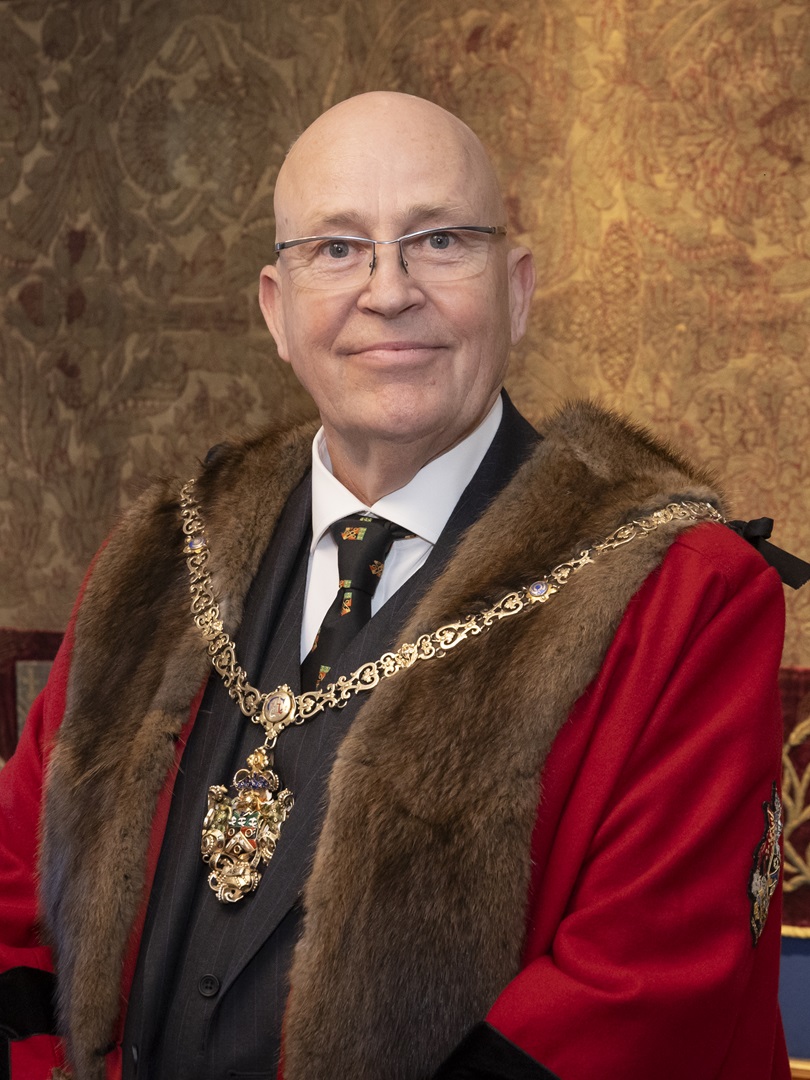
Master - Mr Leigh Johnson
The Worshipful Company of Coopers is based in the City of London and received their Royal Charter in 1501. In modern times it has evolved into the trustee of six principal charities and a social and charitable enterprise that retains an identity focused on the ancient craft of cask making.
We welcome members to enjoy a fellowship around our shared values and an interest in the history, culture and charitable endeavours that our company has pursued for the last 500 or so years.
Following on from our successful Autumn Prospective Members' Evening our next evening, which is designed to help those considering joining as Freemen to the Company, will be held on Monday 28th April 2025. You are welcome to email events@cooperscompany.co.uk to be kept informed or if you require further information, please email clerk@cooperscompany.co.uk. Those interested in joining require a sponsor (an existing member of the Company) who should email the Clerk to notify us of your intention.
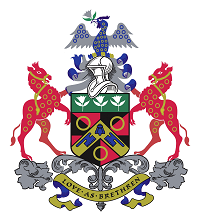
If you want to find out more about your relatives connected with the Freedom of the City, or simply learn more about your past, contact the
The Worshipful Company of Coopers
“Charity, Education, Fellowship, Civic Life”
Corporate Affiliates’ Programme
Join us to form long-term, mutually beneficial relationships and assistance in fulfilling your Corporate Social Responsibility goals.
Potential Corporate Affiliates
The Worshipful Company of Coopers has launched the Corporate Affiliates Programme with a view to partnering with likeminded public companies, with whom we share common aims and objectives in areas such as ethics, diversity, charity, education and sustainability.
Benefits of Corporate Affiliation
Affiliates will nominate four Senior Company Executives/Directors to ensure the Affiliation is managed and enjoyed at the commensurate level.
Please download the brochure from the link below to find more details and contact clerk@cooperscompany.co.uk if you have any questions or are interested in exploring this opportunity further.
![]() Download the brochure
Download the brochure
The Charity is an amalgamation of five former charitable trusts of varying ages of foundation which have derived their income from bequests made throughout the Company's history and the distribution of this income is governed by the Charity’s constitution.
The Charity was granted formal approval by The Charity Commission in December 2013. The Trustees are responsible for the proper distribution of funds, which in practice is administered by the Charities Committee which reports to the Trustees annually.
The former charitable trusts comprise the Ratcliff Pension Charity, the Palmer Foundation, the Harold Griffin Gift Fund, the Strode’s Egham Pension and Eleemosynary Charity and the William Alexander’s Coopers’ Liverymen Fund.
The Charity is established for the public benefit to make grants for the following charitable purposes as the Trustees in their absolute discretion may determine:
- To assist persons in conditions of need, hardship or distress in the Greater London area, the County of Surrey and members of The Worshipful Company of Coopers, their widows and dependants;
- To advance education generally, but not exclusively connected to the trade of cooperage and pupils of the schools associated with The Worshipful Company of Coopers, namely The Cooper’s Company & Coborn School (Academy) and Strode’s College;
- To preserve the history and heritage and to advance the public’s education of the ancient trade of Cooperage; and
- To support such other general charitable purposes as the Trustees may in their absolute discretion determine.
The Coopers' Livery Housing Fund (CLHF)
In partnership with the Shaftesbury Housing Group and the London Borough of Tower Hamlets, the CLHF created an innovative project and a significant step in the improvement of services for older people in Tower Hamlets through the building of Coopers Court. To celebrate our quincentenary in 2001 the Company raised over £500,000 to create sheltered accommodation, comprising 40 flats, in Tower Hamlets.
This was the historic centre of the cooperage industry, from which the City, port and river were served. The loan of £500,000 was returned to the Company when Shaftesbury Housing Group sold its stake in Coopers Court and the Company then looked for another deserving case and potential recipient. In 2010, the CLHF loaned £500,000 for Coopers Chase in Enham for residents who require the opportunity to establish financial and social independence, whilst acting as a stepping stone from an institutional environment to life in the community.
The Harold Griffin Fund (HGGF) - Charity Commission Scheme No. L.2/234612 A/1
This Charity was established in 1937 by the late Past Master Harold Griffin through the benefaction of six freehold houses in Thessaly Square, Battersea. Originally, they were to be offered, free of rent and all outgoings, to any Liveryman or Freeman of the Company or to their widows or dependants, or thereafter to needy old persons of Battersea, or, at the entire discretion of the Court, to any other charitable purposes.
The site was bombed during the second world war. Two houses were destroyed and the remaining four heavily damaged, and when the area was subsequently rebuilt by the Local Authority the site was classed as “added land”. With the approval of the Charity Commissioners, it was sold under a compulsory purchase order and the proceeds reinvested in Trustee securities. Part of the proceeds were used for the purchase and installation of stained glass windows in the Stepney Parish Church of St. Dunstan and All Saints and in the City Church of St. Magnus the Martyr.
This is the least fettered of all the Company's charities and the income may be applied to any charitable purpose. In practice the Court acts on the recommendations of its Charity Committee.
This Charity, which incorporates the former Benevolent Fund, receives substantial annual donations from the Company’s corporate funds and other charitable bequests to the Company.
The Foundation was founded in 1979 by the late Past Master E.W. Palmer, who subsequently bequeathed to the Worshipful Company of Coopers a property company, Waverley Court Limited, stipulating that half of the income received should be for the benefit of the Palmer Foundation and half for the Coopers’ Company and Coborn Educational Foundation.
A new Board of Directors was appointed under the chairmanship of Pastmaster Brian Atchley. Over a period of a few years the mainly residential properties were sold at a substantial profit to valuation. Waverley Court Limited was eventually “wound up” and the proceeds distributed accordingly.
Grants are made regularly to selected charities and to other registered charities in response to appeals; and awards of scholarships, bursaries and grants are made to the Company’s School and College.
This was founded under the Will of Henry Strode, a London merchant and son of a Cooper, who served as Master in 1703 a year before he died, having previously served as Auditor, Assistant, Renter Warden and Upper Warden. It originally provided for the building of Almshouses and an endowed elementary school, but in 1824 judgement was given against the Company in proceedings in the Chancery Court alleging maladministration of the Charity. This led the Charity Commissioners to step in and to set up successive schemes under which the almshouses were finally replaced by pensions payable to residents of the parish of Egham as constituted on 22 September 1911.
This scheme was superseded by another, sealed in January 1977, which allowed the few remaining pensions to continue, other funds to be applied to the relief of needy persons in the original parish - and exceptionally, and at the Trustees' discretion, to the residents immediately outside.
The Ratcliff Pension Charity (RPC) - Charity Commission Scheme No. L.2/234613 A/1
In 1536 Nicholas Gibson, who had served as Prime Warden of the Grocers’ Company, caused to be erected and endowed alms-houses for fourteen men and women and a school for thirty boys. His widow, who subsequently married Sir Anthony Knyvett and became known as Dame Avice, transferred them to the Company shortly before her death in 1554, when the school became known as the Coopers' School.
Henry Cloker (see below) also left property to benefit this charity: other substantial benefactors include Peter Thelloe, Tobias (Toby) Wood, Richard Young, Henry Strode and John Banfield.
This Charity was formed in 1896 because of the 'splitting' of the original Ratcliff Charity into two separate schemes - the Stepney & Bow Educational Foundation, concerned solely with the administration of that part of the bequest concerned with education, and the Ratcliff Pension Charity to continue the alms-house and pensioners’ purposes of the original Gibson bequest. It financed the Company's Charitable work in Stepney and Bow and the wider Tower Hamlets area by making grants to needy residents and to welfare organisations.
The Coopers' Company and Coborn Educational Foundation - Charity Commission Scheme No. L.2/234613 A/1
Under a scheme made by the Charity Commissioners in 1891, two schools at Bow, one for boys founded in 1536 and one for girls founded in 1701 by Mrs Prisca Coborn, were administered by a Board of Governors nominated by the Company, various public bodies and local parish churches.
During the second world war the local population had considerably decreased and by 1945 many pupils were living out in Essex. The difficulty in attracting pupils, the mounting cost of travel and the reluctance of the County Educational Authorities to continue financial support, rendered a move inevitable.
On 6 May 1970, the Foundation Stone of a new coeducational, school, to be known as The Coopers' Company and Coborn School, was laid at St. Mary's Lane, Upminster, Essex, in the London Borough of Havering, and the School was officially opened by the Lord Mayor of London in September 1974. The Coopers' Company nominate seven Governors to the Governing Body of the Foundation.
The Company appoints six of the 21 School Governors responsible for the appointment and remuneration of the Head Teacher and staff and for the general supervision of the school.
The school premises are owned by the Coopers' Company and Coborn Educational Foundation, which also holds property and some securities. The Company appoints seven of the twelve Governors of this Foundation, the whole income of which is applied to the payment of such annual amounts as the Governors of the school may require meeting their obligations under various Education Acts or similar orders; to establish financial reserves against extraordinary repairs, additions or improvements and to subsidise a Sunday School in the parish of Bow to the extent of £20 p.a. Any residue is to be applied to educational benefits to persons who have attended the school for two or more years and who have not yet reached the age of 25, or to support voluntary organisations in the boroughs of Tower Hamlets or Havering having educational objectives.
The Cloker Bequest
In accordance with the Will of Henry Cloker dated 1573, an annual sermon is required to be preached on New Year's Day. In May 1974, it was agreed, with the consent of the Worshipful Company of Grocers, (because New Year's Day would in future be a Bank Holiday) that the Cloker Service should in future be held on the second Wednesday in January. For various reasons, it has subsequently been changed and a Service is now held in October in the Church of St. Botolph’s, Bishopsgate. The Grocers’ Company is concerned under the terms of the Will.
This service is attended by the Master and Wardens and the Master and Clerk of the Grocers’ together with any members of the Company who may so desire. A portion of the Will is read by the Clerk, and after the sermon various small sums of money prescribed in the Will, amounting to about £20 in all, are distributed in the Vestry. The Grocers' Company is under obligation to verify each Midsummer Day that the terms of the Will have been strictly observed, for which they are entitled to be paid two guineas. Such monies as have arisen from his bequest have long since been absorbed into the Company's charitable resources.
In 1910 the school was taken over by the Surrey County Council and elevated to secondary status. In 1975 it was made co-educational and became Strode’s Sixth Form College.
It is important to differentiate between the College and its Governors (who are now known as Members of the Corporation of Strode’s and who have responsibility for all educational aspects of the College) and the Foundation and its Trustees who own, and are responsible for, the extensive site and buildings in the centre of Egham which form the College (including those erected by the Surrey County Council), but none of the moveable fixtures or fittings or scholastic equipment of the College itself. Of the 18 members of the Corporation of Strode’s College 4 are nominated by the Trustees of the
Strode's Foundation.
The Foundation was established under a Scheme dated 9 November 1915, later superseded by three further Schemes. There are 9 Trustees of whom 2 are Members of Strode's Corporation, nominated by the Company.
The income of the Foundation is applied to the provision and upkeep of the buildings, to maintenance allowances to pupils, to the award of leaving exhibitions and to general educational benefits for leaving members of the College who are qualified under the Scheme.
At the date of writing, 2017, five of the Foundation Trustees are Liverymen of the Company.
A pupil of the College is apprenticed to the Master every year and on successful completion of the apprenticeship may apply for the Freedom of the Company (fees waived) and thus of the City of London.
This Fund results from the amalgamation for administrative convenience of two charities with similar purposes under a scheme agreed with the Charity Commissioners and sealed in June 1976, their purposes remaining unaltered.
That of William Alexander, who was the son of a publican and had survived four wives, was established under a Will dated 1725, the year before he died, but not proved until 1729. In 1943 the Charity Commissioners sanctioned the sale of land in the parish of Woodham Mortimer in Essex, from which the Fund had derived rent, and the investment of the proceeds in gilt-edged securities.
The other charity, the Old Coopers’ Liverymen Fund was instituted in 1844.
Application of Funds
Restricted to grants of money to needy members of the Livery or the Freedom, their wives, their widows and their dependants.
The Old Boys' Prize Fund
This fund was established by the Association of Old Coopers' School Boys under a Trust Deed dated 1885. It is applied to the Old Boys' Essay Prize, the winner of which is apprenticed to the Master each year. If he has served faithfully, he is invited to apply for the Freedom of the Company, and thus of the City of London. If accepted, Freedom fees are waived.
It is important to distinguish between the former Stepney & Bow Foundation, the Coopers' Company and Coborn Educational Foundation and its Govenors, and the Coopers' Company and Coborn School and its Govenors.
As with Strode's Foundation, the Company is not financially involved in its affairs, nor has it any direct interest other than through its six nominated School Governors and its seven nominated Foundation Governors; but it does support both the School and the College with the annual award of bursaries and with other substantial gifts. In 1986, for example, the Company presented the School with a new Steinway grand piano to mark its 450th. Anniversary.
Grants are usually made on annual basis and may not be repeated.
Needy individuals (especially the elderly and infirm) who are receiving all of their national and local financial support or support in kind to which they are entitled but still remain “needy”. Subsidising or compromising an individual’s right to national and local support must not occur.
Local organisations that provide help and support to needy individuals or clubs serving a local community in the operative areas of the Charity.
City of London causes sponsored by the Lord Mayor or the Corporation or other “worthy” bodies in the City to raise funds for charities aimed at individuals.
National organisations which work in the operative areas of the Charity and which are financed on a local basis (e.g. Age Concern).
Donations will not normally be made in relation to:
- Individuals and organisations outside the operative areas of the Charity;
- The education of individuals;
- National or international bodies which work on a centralised basis;
- Projects involving the erection and/or maintenance of buildings or other structures;
- Organisations with large overheads;
- Organisations with large unexplained capital reserves;
- Sponsorship, marketing or other fundraising activities;
- Bursaries or long term (more than 3 years) projects;
- Organisations outside the UK or overseas expeditions or travel;
- Environmental projects.
Further Information
The application process and application forms
Our existing charitable benefactors
A copy of the application form will download by clicking the link below:
Application formThe Charity Committee will review applications in February, June, September and November. The application process might take up to 3 months to gain approval.
- Initial Assessment; if on assessment the application is within the terms written above, it will be forwarded to the Charities Committee for consideration.
- Committee Consideration; the Committee will either approve (or not) the application outright, or may direct a visit to verify the terms of the application.
- Committee Visit Assessment; Applications may include an examination of the applicant’s accounts and online information in addition to a visit or interview by members of the Charities Committee.
Successful Applications
- Short term, one off grants up to £1,000 may be made as determined by the Charities Committee and depending on the level of emergency;
- Long term grants, of up to £5,000 annually, for up to a period of 3 years may also be made as determined by the Charities Committee, after which the grant will be reviewed if a further period of support is sought.
How to Make an Application
- Short or long-term applications should be completed online or by hard copy and sent via email to: clerk@cooperscompany.co.uk or post to The Clerk, The Worshipful Company of Coopers, Coopers' Hall, 13 Devonshire Square, London EC2M 4TH.
- Please ensure that the application is correctly completed and falls within the guidelines and clearly identifies the purpose of any grant and that any costs associated with any project have been realistically assessed.
- We will endeavour to contact you within two weeks of the meeting of the Charities Committee at which the application is considered.
- Written reports on progress may be required during the term of any grant.
A copy of the application form will download by clicking the link below:
Further Information
How and when we make grants
Our existing charitable benefactors




